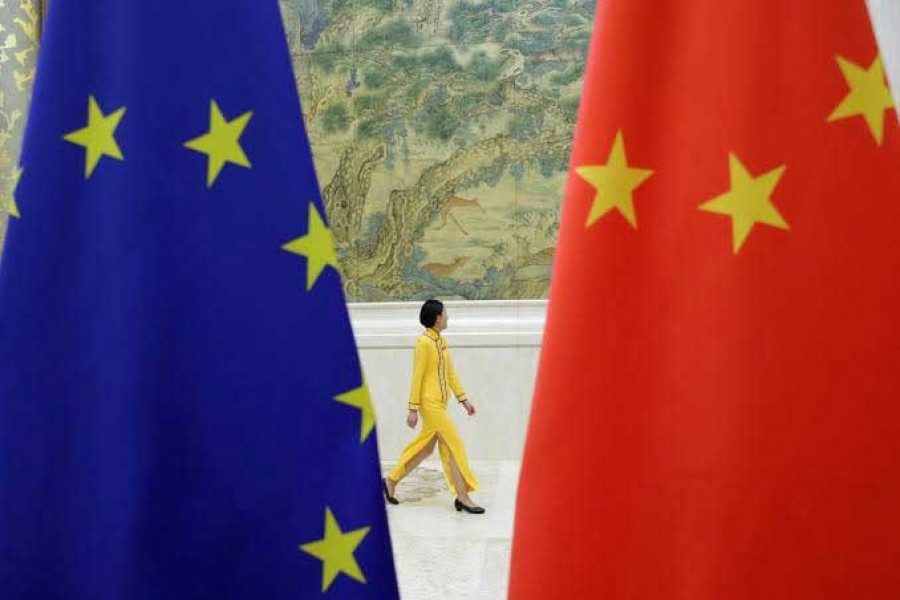
Published :
Updated :

When Chinese Premier Li Keqiang met with High Representative of the EU for Foreign Affairs and Security Policy and Vice-President of the European Commission Federica Mogherini in late October, he expressed hopes both sides could complete China-Europe investment agreement negotiations next year as scheduled.
It was a positive signal to the world against the backdrop of the China-US trade war, enduring trade conflicts between the US and European countries, rising protectionism, unilateralism and anti-globalization. As a result, people have regained confidence in the development of China-Europe relations and the improvement of world trade.
The China-Europe economic relationship had faltered for some time, especially when the "EU-China - A strategic outlook" released in March, for the first time, formally labeled China an economic "systemic rival" and a "strategic competitor." Faced with stark comparisons between China's rapid economic development and EU's own, the EU has been overburdened by excessive anxiety and has adopted anti-dumping and anti-subsidy measures, while establishing an investment review mechanism to achieve market distortion.
At the same time, China is required to "fully reciprocate" on bilateral economic and trade activities. It is wrong and illogical for the EU to take such a confrontational approach instead of cooperating to resolve the matter. The latest progress on China-Europe investment agreement negotiations provides the world a revelation on how to handle economic and trade frictions between different economies while maintaining a dynamic balance between developed and emerging economies.
China-EU economic and trade cooperation has a solid foundation and bright prospects.
First, unlike the US, which has defined China as a strategic competitor, a conflict between China and Europe in terms of strategy, structure and geopolitics does not exist.
Second, China and the EU have identical or similar positions in many aspects of global governance on multilateralism, free trade, climate change and environmental protection.
Third, both have a mutual understanding and dependence on the world economy and bilateral relations are characterized by mutual benefit through cooperation.
Finally, cooperation between China-EU, China-EU member states, and China-EU sub-regions has developed over the years. More than 50 economic and trade dialogue and consultation mechanisms, including the China-EU High-level Economic and Trade Dialogue, provide a solid infrastructure and institutional guarantee for bilateral exchanges.
Most importantly, China has given a positive and pragmatic response to economic and trade concerns raised by developed economies, including the EU, from the government's position to specific actions. In response to concerns about market access, intellectual property protection and compulsory technology transfer, the Chinese government has implemented measures that have shortened the negative list of foreign investment access by adding free trade pilot zones.
Foreign investment restrictions in manufacturing, mining, agriculture, forestry, animal husbandry and fishery industries were largely eliminated. With the promulgation of the new Foreign Investment Law, foreign investors are given national treatment and 100 percent ownership in certain industries where ownership caps previously applied.
China continues to prohibit compulsory technology transfer and strengthen intellectual property protection. By eliminating remittance restrictions, China has committed to opening up the capital market further, which has significantly improved the business environment.
The 2019 World Bank ranking of the Global Business Environment Index shows China jumped from 78th in 2017 to 31st. The improvement of China-EU economic and trade relations can also be seen as the result of China's practical actions.
As globalization faces a headwind amid US trade protectionism and economic bullying, the EU should accept how China is at a different development stage, respect China's development rights, and use positive and constructive consultations rather than pressure to deal with bilateral economic and trade issues. Once this is achieved, both sides could embark on a road of cooperation that would benefit their people and the interests of all countries involved.


 For all latest news, follow The Financial Express Google News channel.
For all latest news, follow The Financial Express Google News channel.